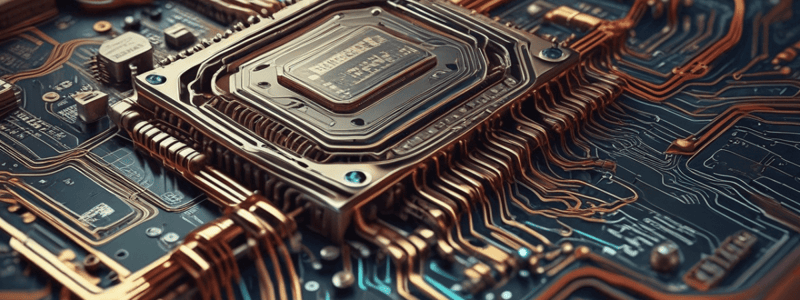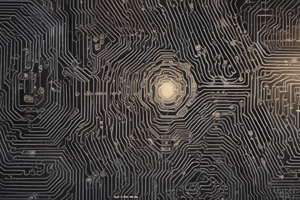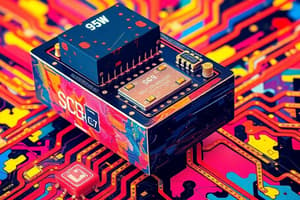Podcast
Questions and Answers
What is the purpose of an SCR in a half-wave phase-control circuit?
What is the purpose of an SCR in a half-wave phase-control circuit?
- To regulate the voltage across the load
- To control the power delivered to the load (correct)
- To filter the ac input
- To adjust the current through the load
In a half-wave power control, what happens to the SCR when the ac input goes negative?
In a half-wave power control, what happens to the SCR when the ac input goes negative?
- It triggers again
- It turns off (correct)
- It remains in the off state
- It continues to conduct
What is the result of triggering the SCR near the beginning of the cycle (approximately 0°)?
What is the result of triggering the SCR near the beginning of the cycle (approximately 0°)?
- The SCR conducts for approximately 90°
- Maximum power is delivered to the load (correct)
- Minimum power is delivered to the load
- The SCR turns off
What is the average voltage equation in a half-wave power control circuit?
What is the average voltage equation in a half-wave power control circuit?
What is the average current equation in a full-wave power control circuit?
What is the average current equation in a full-wave power control circuit?
What is the equation for calculating the average voltage in a full-wave power control circuit?
What is the equation for calculating the average voltage in a full-wave power control circuit?
What is the advantage of using a full-wave power control circuit over a half-wave power control circuit?
What is the advantage of using a full-wave power control circuit over a half-wave power control circuit?
How is the SCS turned off?
How is the SCS turned off?
What is the primary application of a DIAC?
What is the primary application of a DIAC?
Flashcards are hidden until you start studying
Study Notes
SCR Applications
- SCR (Silicon-Controlled Rectifier) applications include on-off control of current, half-wave power control, full-wave power control, and crowbar.
On-Off Control of Current
- SCR circuit allows current to be switched to a load by momentary closure of switch SW1 and removed from the load by momentary closure of switch SW2.
Half-Wave Power Control
- A common application of SCRs is in the control of ac power for lamp dimmers, electric heaters, and electric motors.
- By adjusting R2, the SCR can be made to trigger at any point on the positive half-cycle of the ac waveform between 0° and 90°.
- The phase angle at which the SCR turns on is called the firing angle, and the angle between the start and end of conduction is called the conduction angle.
Firing and Conduction Angles
- The firing angle is the phase angle at which the SCR turns on.
- The conduction angle is the angle between the start and end of conduction.
- For example, if the SCR turns on at 90°, the firing angle is 90°, and the conduction angle is from 90° to approximately 180°.
Full-Wave Power Control
- The operation is similar to half-wave power control, except that in this configuration, either one of the SCRs are conducting in either positive or negative cycle of the input signal.
- The average voltage and current can be calculated using mathematical equations involving the firing angle and conduction angle.
SCR Crowbar
- The figure shows a power supply of VCC applied to a protected load.
- Under normal conditions, VCC is less than the breakdown voltage of the zener diode.
Silicon-Controlled Switch (SCS)
- Similar to SCR, but has two gate terminals, cathode and anode gate.
- Four-terminal thyristor used to trigger the device ON and OFF.
- Faster turn-off time than SCR.
- Used in counters, registers, and timing circuits.
How to turn on SCS
- A positive pulse applied on the cathode gate or a negative pulse applied on the anode gate.
How to turn off SCS
- A positive pulse applied on the anode gate or a negative pulse applied on the cathode gate.
- Reducing the anode current below the holding current by using BJT as a switch to interrupt anode current.
DIAC
- Two-terminal four-layer thyristor which conduct in EITHER direction when properly activated.
Studying That Suits You
Use AI to generate personalized quizzes and flashcards to suit your learning preferences.





